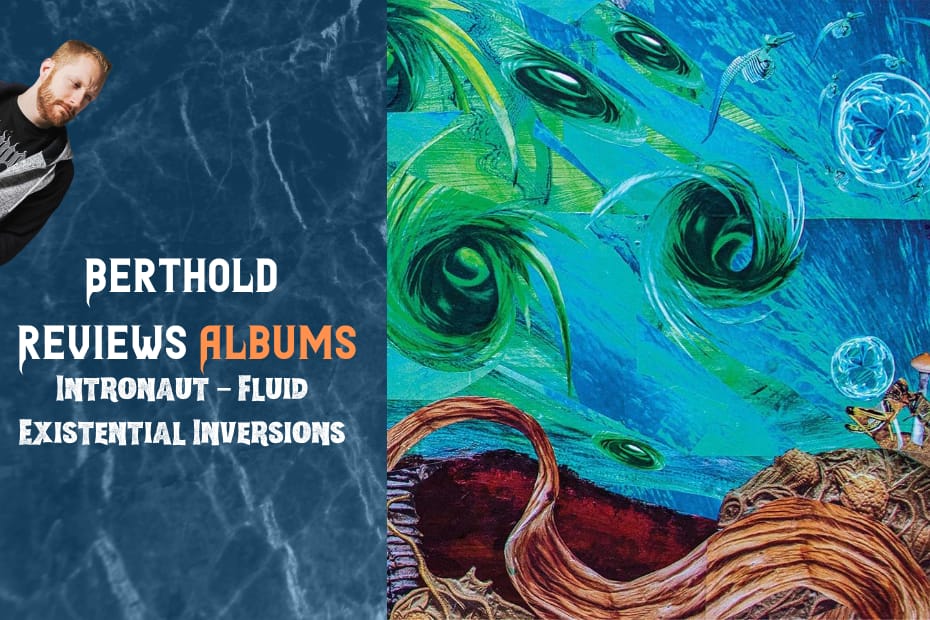9.5/10
Ever since their debut album dropped 14 years ago, Intronaut has pushed the boundaries of progressive metal by experimenting with unorthodox compositions and fusing different genres together. On their newest album, Fluid Existential Inversions, Intronaut’s progression as musicians have culminated with their most dynamic record to date, ripe with the perfect blend of unconventional songwriting and innovative complexity fans have come to embrace.
The 52-minute escapade to the fourth dimension begins with “Procurement of Victuals,” a short introductory track with brutal vocals, heavily distorted guitars, and drawn out beats. However, the cacophonous assault of discordant sounds ends as quickly as it began, leading us to the band’s first single, “Cubensis.” Kicking off with frenetic polyrhythmic beats, the track evolves by transitioning to a more atmospheric progressive structure. The math-rock complexity is on full display with the band’s new drummer, Alex Rudinger, easing the doubts of whether or not Intronaut would be the same after long-time drummer Danny Walker was dismissed last year. The striking contrasts between punishing beats and tranquil sequences blend together harmoniously on this track, creating a vibrant and visceral experience.
Up next is “The Cull,” showcasing the darker side of the band with rough vocals and a sludge-metal like distortion effect, enhanced with haunting overtones courtesy of the band’s first foray into using synths. However, it’s at the midway point of the song where Intronaut’s dazzling songwriting is on display. Few progressive metal bands have mastered the art of oscillating from sinister rhythms to melodious structures quite like this. As exhibited on this track and the rest of the album, it’s evident that all musicians brought the A-game and delved into paths previously unexplored. In particular, Joe Lester, the band’s prolific four-string ninja, exhibits unrivaled mastery of the bass, cementing his position within the upper echelon of bassists in music.
While records traditionally taper off in the middle, Fluid Existential Inversions bucks the trend with nothing but perfection as the album progresses. “Contrapasso” is quite the chaotic experience, commencing with ominous beats before transcending into a post-metal venture that awakens the senses. It’s during the middle of the song where you’re brought back into Intronaut’s experimental chamber where the band’s proficiency culminates in a jazz-fusion inspired medley juxtaposed by crushing beats and mellifluous cadences. “Speaking of Orbs” feels like it would be the ideal soundtrack for a futuristic film, replete with digital overtones and some of the most brutal breakdowns on the album. Lastly, “Tripolar” takes after its namesake, perfectly illustrating the diverse style of the band and eclectic musicianship on hand. Easily the meatiest track on the album, the sludge-metal influences are evident here with a refreshing reprieve in the middle, emblematic of wrath fading away only to be replaced by a sedated equanimity.
As if there wasn’t enough experimentation and dexterous noodling throughout the album, the math-rock introduction on “Check Your Misfortune” is enough to satiate any prog fan’s desires. The penultimate track, “Pangloss,” recaptures the sinister element found on “Tripolar,” serving as a sonically pleasing appetizer to the grand finale. Lastly, we get to “Sour Everythings,” the closing track on an otherwise brilliant record. Cutting straight to business, this seven-and-a-half-minute epic encapsulates everything extraordinary about this recording, fusing different styles to deliver one final performance to remember.
The style exhibited on their previous release, The Direction of Last Things, has not only carried over to this album but has evolved to the point where Intronaut must be considered one of the best acts in the genre. They have transcended to the point where they no longer should play second fiddle to bands in the space, but instead looked upon as progenitors of the new wave of progressive heavy metal.
